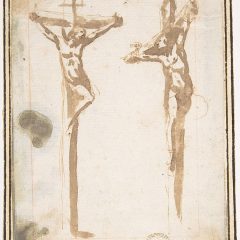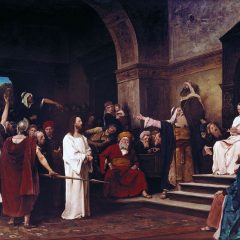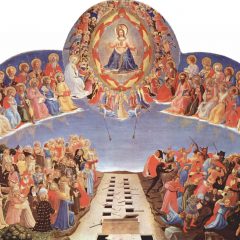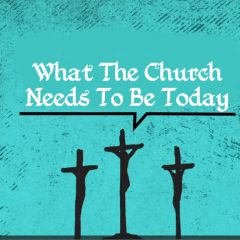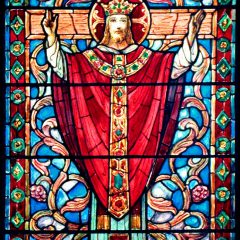Christ The King
The Kingship Of Christ

Feast Of Christ The King
Fr. Peter Robinson
Preached: November 26, 2023
This coming week, we close our Church’s liturgical year. From a liturgy point of view, next Sunday is Advent — liturgically, our Church’s new year! Is it not appropriate then, that we conclude this past liturgical year with this reminder? That our Lord Jesus Christ is King of the universe?
Let’s be honest: we need the comfort of knowing that our Lord is King of all, don’t we? For example, a poll this year (in North America) was taken of Gen Z – (those born between 1997-2012, so those who are currently 11-26 years of age), and the poll listed their top 5 concerns. The results are actually quite surprising …
- The rising cost of living
- Housing affordability and accessibility
- Healthcare
- The economy
- Climate change and the environment
Given our concerns, as we celebrate Christ the King, we might think that our Church would therefore choose Bible passages that are about crowns, medals, processions and majesty, right? But she does not, our Church. Rather, she turns to Bible passages that speak about “sheep” (which, by the way, are not the most intelligent of animals). In the British countryside, where there are many sheep, they can usually be left to graze on their own. But in the hilly country of today’s Israel, the land of Palestine, there is always a shepherd to look after them. Even today, sheep can be guaranteed to wander, wide-eyed, straight in front of a passing car — and then, in their panic, to run the wrong way.
So, the Prophet Ezekiel tells us (over 500 years before Christ was born) that God promises to “… search for my sheep and … sort them out. As shepherds sort out their flocks when they are among scattered sheep, so I will sort out my sheep” (Eze 34:11-12). And “I shall judge between sheep and sheep, between rams and goats” (v. 17).
According to St Matthew, Jesus told it this way: Jesus (King of the universe) promises us that there will be a day when the world is finally divided into “sheep” and “goats.” This confrontation will be an experience far more awesome, far more shattering than any description can express. And yet, for those who are faithful to our Lord, it will be fulfilling and re-assuring.
I. First, we will be judged uniquely on our treatment of those in any kind of need. Interestingly, according to Jesus, we will not be judged on the basis of our prayer-life; and not on our asceticism or the penances we have undertaken. No, we will be judged on our respect for others, on how far we look to see what they need and what we can give. In Jesus’ words: “I was hungry and you gave me food, I was thirsty and you gave me something to drink, I was a stranger and you welcomed me, I was naked and you gave me clothing, I was sick and you took care of me, I was in prison and you visited me” (Mat 25:35-36).
II. The second striking point is the reason for the first: that Christ is in some way present in each person > what we do to others, we do to Christ. You see, our Lord’s kingship is modelled on God’s kingship. In fact, Jesus’ first proclamation was “The kingship of God has come upon you.” So, each person we meet is an image-bearer of God. And Jesus will judge us on how we have treated that person, that image-bearer — before us, in her or his need.
So, we celebrate Christ as “king” today. Like sheep, we need God’s care to keep us on the right path. We need God’s strength (and his heart) to respond to the needs of others. We glory today in this fact: our Jesus, who is King of the universe, is also the Good Shepherd. As we start a new Church year, he cherishes us, he guards us, he heals us, he calms our fears, and he even gives his life to us in the Holy Eucharist.
This is what Christ’s kingship is all about …
Leadership Matters!
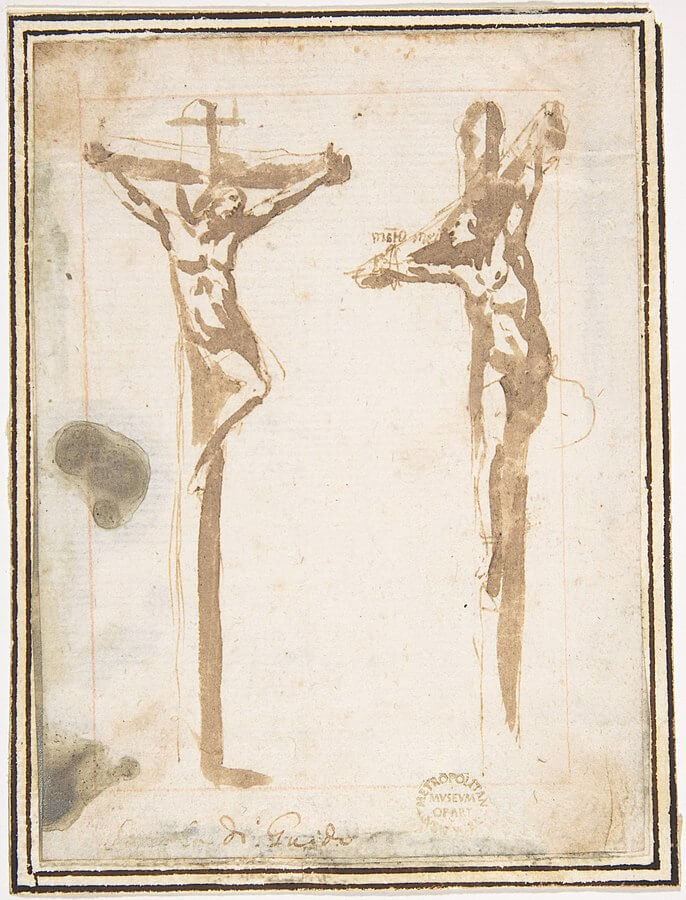
Feast Of Christ The King 2022
Fr. Mark Gatto
Preached: November 20, 2022
Leadership matters. The kind of leadership we have in politics and nations, in business, in the church, in families, it really matters.
Why does the church have a Feast called Christ the King? In 1925, Pope Pius XI established this Feast for the last Sunday of the Liturgical Year. It was in response to the increase of secularism and atheistic ideologies that wanted to establish a society with no reference to God. Today it can be an important reference to us about the type of leadership we need in the world.
The fact is that leadership matters. The type of leaders we have matters. Jesus presents us with a model of leadership that is needed in our world. It is not based on violence, control or power over others. It is not authority that benefits the leader alone. We see the leadership of Jesus on the cross. Surrendering his life for the sake of others. Refusing to compromise for his own benefit. A humble servant leadership that brings life to others.
Even as he is dying on the cross we see him turn to the criminal on the one side and promise him eternal life, “today you will be with me in paradise.” It is this model of leadership seen in Jesus that is needed by all leaders today.
This includes leaders of governments and nations. Leaders in business. Leaders in the church. Leaders in families.
Poor leadership of nations and governments leads us to violence and war. Seen so clearly in the Ukraine at this time. Poor leadership in nations and governments leads to the failure to respond to important issues humanity faces, such as climate change and poverty. Good leaders of nations and governments remove corruption, it is focused on the common good. Ready to lay down their life for others like Jesus on the cross.
Poor leadership in businesses leads to the exploitation of workers and of the environment. Good leaders in business leads to good employment and working conditions. They are not focused on profits alone, but also the well-being of workers and creation.
Poor leadership in the church leads to corruption, unaddressed abuse and disunity. Good leadership in the church is rooted in the self-giving love of Jesus seen on the cross. The church needs bishops and priests who are humble servant leaders.
Today the vision of the church sees once again that every member of the church has a priestly call rooted in their baptism. Not only bishops and priests are called to leadership in the church, every member of the church is called to take on responsibility for the mission of the church. As someone who is baptized, you all have a responsibility for the church. We need to journey together as the church in the world.
Poor leadership in families causes lots of brokenness and hurt. Spouses are called to lead like Jesus, self-giving love reflected on the cross. To offer their life for each other. Parents are called to self-giving love, giving of themselves for their children like Jesus on the cross. In the hurts and divisions within families we are all called to leadership that brings healing and forgiveness. Even in the crosses within our family lives, we need to be like Jesus bringing life to one another.
As we celebrate the Feast of Christ the King, we are to look to the model of humble servant leadership seen in Jesus giving his life on the cross. Imagine the difference if leaders of nations and governments, leaders in business, leaders in the church and leaders in our families followed the model of Jesus. Leadership matters, look for leadership that is modelled after Jesus. Become leaders that embrace the humble servant way of Jesus.
Are You On The Side Of Truth?
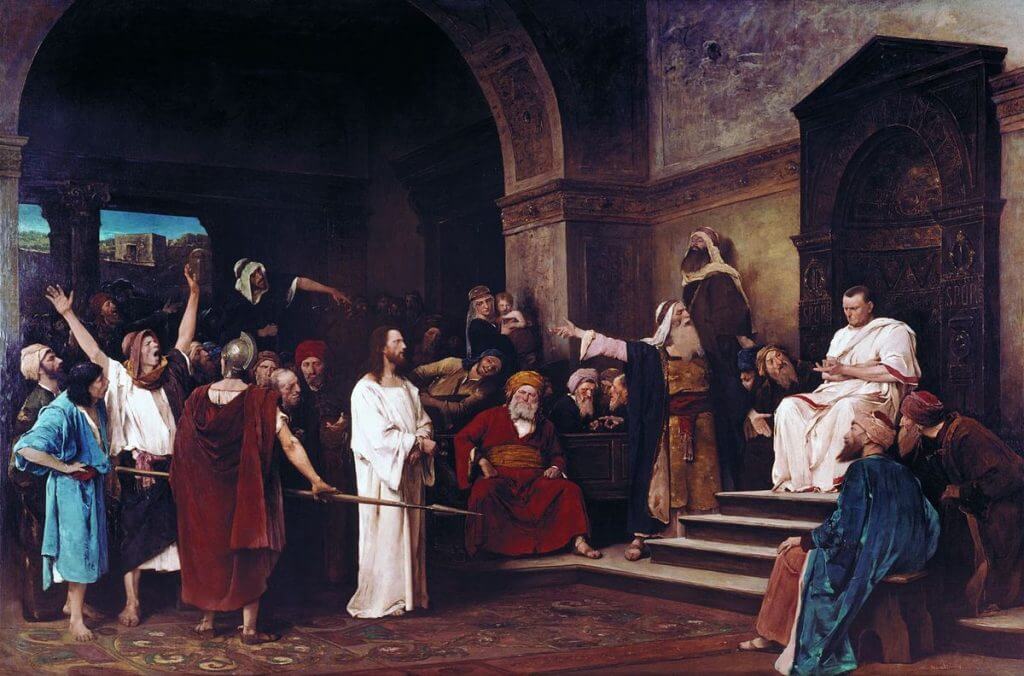
Feast of Christ the King 2021
Deacon Tom Vert
Preached: November 21, 2021
Everyone who belongs to the truth listens to my voice.”
In other translations of the Bible, it says: Everyone who is on the side of truth hears my voice
So, if we belong to, or on the side of truth, then the truth is critical to us.
The next line in this gospel that we don’t read is Pilate responding to Jesus saying, “What is truth”?
And isn’t this the same question many of us are asking today in so many cases?
What is the truth? And where do we find it?
Recent surveys have said that only 46% of Canadians trust the news, and an even worse statistic is that in the USA this drops to 29%.
So, if most people do not trust what they are hearing, where do they find the truth?
Internet and social media are the major sources of news today and yet we know that the information is not accurate.
There is a great documentary on Netflix called “the Social Dilemna” in which people who helped design the internet and social media, confess that they manipulate your feed to show you only what you want to see and for you to never see another contrary view that may challenge your thinking.
They purposefully push you to sites that reinforce your opinion and create more and more tension with people on the other side of any issue.
So, what is the truth? How do we find it?
If Jesus is telling us that we are to belong to the truth and to be on the side of truth, then what is our responsibility as Christians?
If we truly want to “hear his voice” and “listen to his voice”, then our mandate to be people of the truth is a challenge that Christ is giving to us.
Pope John Paul II had a great quote for us “Faith and reason are like two wings on which the human spirit rises to the contemplation of truth; and God has placed in the human heart a desire to know the truth.”
God asks us to actively seek the truth using both our faith and reason (or human knowledge) to be amazed at this world He has created and to get closer to Him because of it.
So how do we do this?
Well in my own faith journey I had many questions! I came back to the faith after a few years away from the church when my children were born.
I had questions, and as an engineer I wanted the truth, the real answers and so I sought them out, to have an informed faith.
It started with the question: “was Jesus really the Son of God or was he just a good preacher or even a myth made up 2000 years ago.”
I went back to the sources, the first century documents and of course found the gospels, but maybe they were slanted towards Christianity, so I looked harder.
I found the writings of the great Jewish Historian Josephus which verified Christ’s existence and the following that he had that grown after his death into Christianity.
I also found the Quran from Muslim teachings showed Jesus as a great prophet.
Therefore, I had to conclude that a questioning faith and reason brought me close to God.
Then I researched the Eucharist, is it really Christ present in the bread and wine we receive. An again I thought, what did those who knew Jesus and followed him immediately say?
In the gospels, the letters of Paul to the Corinthians, the writings of St. Justin, St. Irenaeus, and an early teaching called the Didache, all written within 100 years of Christ’s death, confirm that the celebration of the Eucharist in a similar but simpler form was celebrated on Sundays.
I was in awe that what we do today is connected to the earliest Christians 2000 years ago with the same blessing over the bread and the cup.
This search for the truth teaches us to go to the source if we want to find the truth and to use our faith and reason that God gave us to ensure that we are not “knocked off the puck” by social media or other sources that are not the truth.
So how can we apply this into our daily lives?
Look no farther than the current discussion on whether we as Catholic Christians should get Covid vaccines.
If we go to the source of reason, we can find the smartest, brightest scientists in the world at the Center for Disease Control in Atlanta that tell us the vaccine is a product of decades of research culminating in a true miracle of science to create something that would protect all of us.
If we to the source of our faith, the Congregation for the Doctrine of the Faith in Rome, Pope Francis and our own Bishop have all said we are to get vaccinated.
Pope Francis said this in August this year: “Thanks to God’s grace and to the work of many, we now have vaccines to protect us from Covid-19.
Pope Francis went on to say that getting a Covid shot that is “authorized by the respective authorities” is an “act of love. Helping others do the same, he said, is also an act of love. “Love for oneself, love for our families and friends, and love for all peoples.”
Truly a clear message for each and every one of us who “belong to the truth and want to hear his voice”.
Similarly, we can ask what the truth is about climate change and our role in it.
Again, we can look to our reason and faith. We look to reason, in documents written by the Intergovernmental Panel on Climate Change…195 world renowned scientist including Canadians who review hundreds of published documents to give us the latest updates and forecasts on how climate change has happened and how it will affect our world going forward.
We can use our reason in watching what is happening in British Columbia this past year – the hottest temperatures on record, the third highest amount of forest fires and now flooding and mudslides that are cutting off the coast from the rest of Canada.
What does our faith tell us? Pope Francis wrote an amazing document in 2015 talking about how we treat “our common home” and said: “Never have we so hurt and mistreated our common home as we have in the last two hundred years.”
“The pace of consumption, waste and environmental change has so stretched the planet’s capacity that our contemporary lifestyle, unsustainable as it is, can only precipitate catastrophes, such as those which even now periodically occur in different areas of the world.”
He goes on to say: “There is a nobility in the duty to care for creation through little daily actions Each community can take from the bounty of the earth whatever it needs for subsistence, but it also has the duty to protect the earth and to ensure its fruitfulness for coming generations.”
What a great message as we seek to live our lives listening to God’s voice to take care of our planet!
The search for the truth as Catholic Christians is our duty, our yoke to bear and our mission to lead.
So, I would invite you this week to ask yourself two key questions:
Do I really want to hear His voice?
And if so, am I on the side of truth?
When Did I See You?

Feast Of Christ The King 2020
Fr. Mark Gatto
Preached: November 22, 2020
Sometimes I wonder, if Jesus were giving a certain teaching today how would it change? I thought about this famous passage from Matthew 25 that we just heard in today’s Gospel, that is so familiar to us. What if Jesus was giving this teaching of Matthew 25 during this Covid pandemic time? Perhaps it would sound like this:
“Come, you that are blessed by my Father, for I was in a store with you and you stayed 6 feet away, I was in a room with you and you wore a mask, you came to church but they were full so you returned home peacefully to be with me there, I was at a funeral with you and you did not hug or kiss me, we could not gather in a large group and so instead you called me by phone.”
Any act of charity, any act of kindness, any practical effort to care for someone in need, whether we realize it or not, we are doing this for Jesus. It does not matter if you are doing it for religious reasons or not.
When Mother Teresa spoke about the schedule of her Sisters, she said they would start the day praying in the chapel. There they would spend quiet time with Jesus in the Blessed Sacrament. Then they would go out into the streets to serve Jesus in the poor.
This is the model of the Christian life. We spend time with Jesus in quiet prayer, we listen to Jesus in the Scriptures. We come to experience Jesus in the Eucharist: listening to him in the Word, united with him in the fellow believers, the body of Christ, blessed by him through the priest and receiving him in our hands in Holy Communion. Then we go out to be with Jesus in the people we meet at home, at work, at play. In each person we care for in some practical way, we care for Jesus.
Where will you meet Jesus in your daily life? Someone sad at home. A friend who is grieving. A co-worker struggling with depression. An elderly neighbour who is unable to get out on their own. The poor within our community. Your own spouse who is struggling. Your own child who is anxious. A parishioner who is lonely. When we reach out to any person in our life, we are touching and caring and listening and speaking to Jesus.
If someone comes to us and says that they are struggling to feel God or to believe in God. We might give them some good reading, direct them to a good web site, send them for a retreat. But, most helpful would be to send them out to care for someone in need. Go out and listen to someone in need. In some practical way to show care for them. It is there that we encounter the living God in the least of our brothers and sisters.
Jesus as king, Jesus as ruler, is not one who dominates, controls, manipulates us. Jesus quietly, simply and humbly serves. The hungry, the thirsty, the stranger, the homeless, the sick, the prisoner. Like a shepherd caring for each one of us. When we care for one in need, then we are joining Jesus the good shepherd. This is the mission of the Church. Church is at its best not when in positions of power, but when caring for the weakest and most in need among us.
What will be the exam at the final judgement? Will we be given a test with questions from the Catechism? Will we be evaluated based on whether we followed certain moral or church rules? Will the number of times we came to church be counted?
It seems rather that in the final judgment we will be asked: when Jesus was sad, when Jesus was hungry, when Jesus was alone, when Jesus was grieving, when Jesus was struggling, did I do something for him? Both the righteous and the unrighteous asked, “Lord, when was it that we saw you…?” He will answer, “… just as you did it to one of the least of these brothers and sisters of mine, you did it to me.”
Spend time with Jesus. Quiet time in prayer in your room, time with Jesus here in the Eucharist, time with Jesus in the Word. But then go out and spend time with Jesus in the people you are with throughout the day. Jesus is waiting for you in one person who needs your care.
What The Church (And Christians) Need To Be

Feast of Christ the King 2019
Fr. Mark Gatto
Preached: November 24, 2019
What will the world look like in the future? Many people write books or articles or give talks with predictions about what the world will look like in the future. Recently I saw a notice for a book called, What is the future of Christianity? We like to look ahead to try to see what to expect.
What will the world be like in the future? What will Christianity look like in the future? What will the Catholic Church be like in the future? It is interesting to think about these future possibilities. But, we are pretty poor in predicting what things will be like in the future. We cannot see very well the unexpected turns and events and changes that we will face.
A more useful reflection is “What type of Church is needed in the future?” “What is the mission of the Church?” What Church is needed, what type of Christians do we need to become?
On this Feast of Christ the King, we are presented with the Gospel account of the Crucifixion of Jesus from Luke’s Gospel. On that Cross we are given two completely different visions of success.
In the Cross we see the full power and force of the Roman Empire. Wealth and military force that allowed them to dominate others, especially the weak and poor. It reflects the vision our world usually embraces.
Our world sees success in terms of wealth, worldly power. It is found in great powers and empires. It is achieved by violence, military force, domination of others. It is self serving.
But God is not found in that show of force and dominance. God’s power is seen in the helpless Jesus, suffering and dying on the Cross. Jesus was not wealthy, powerful, successful in the eyes of the world. He died helpless on a cross being ridiculed even by a lowly criminal beside him.
In history, the Church, we Christians, are constantly tempted to strive for worldly power, wealth, success, influence. We desire to be important in the eyes of the world. But, Jesus gave us an entirely different vision on that Cross. Not self serving but self giving.
True power and strength for the sake of the world is not found in violence, in military force, in wealth, in an empire that dominates. The Church is not called to be successful or important in the world, nor to be an empire that dominates. Like Jesus, our mission is to serve the world in the humble offering of our lives.
We need to ask ourselves as Christians, “what kind of Church will be faithful to the Gospel, what kind of Church reflects this vision of Jesus on the Cross?” This is the Church that our world needs. I want to give a list of some of the things that this Church will be called to be today.
Therefore, it is what you and I as Christians need to be.
- The Church needs to be an instrument of peace. To work for harmony between peoples, in particular between people of different religions. It is why Pope Francis often speaks about the need for inter-religious dialogue. He is presently visiting Thailand. A country that has very few Catholics, primarily a Buddhist nation. He is there giving us a sign of the call of the Catholic Church to be a leader in working for harmony between different religions and peoples. We are fundamentally one human family. We are to be instruments of peace.
- The Church needs to work for the common good within society. We are not to focus on our own needs, but what is the good for all people. This means we are to have a special concern for the poor and needy among us. We are to work for the common good.
- The Church needs to embrace simplicity and to have a deep care for our common home in
creation. We need to embrace a simplicity of life that cares for all creation.
- The Church must embrace a non-violent way of being. We need to reject violence, force,
resentment. This includes in the words we use against others. We need to be people who are
non-violent in relating to one another.
Each of you could add to this list of what the Church needs to be today. Perhaps take some time to add to this list, what kind of Church is needed today?
What will the Church be like in the future? I cannot give you a very accurate picture of that
future. But, we can have a clear picture of what the Church needs to be in the future. On the Feast of Christ the King, we are presented with the vision of the Cross.
The Church is not to be worried about being successful in the eyes of the world, it is not about being wealthy, powerful, influential. Jesus served humanity and the world most when he died helpless on the Cross. Our Church will offer most when we offer our lives not for our success, but to humbly serve. This will mean being a church that is an instrument of peace, working for harmony between peoples, a church that works for the common good within society, a church that embraces a simplicity of life and cares for creation, a church that embraces a non-violent way of life.
This is the Christianity that will be faithful to the Gospel.
This is the Church that we need to be for the sake of the world.
Christ The King?? – Fr. Mark

Feast of Christ The King 2018
Fr. Mark Gatto
Preached: November 25, 2018
This Feast of Christ the King makes no sense. Does this image reflect Jesus of the Gospel?
When we think of a King we think of a great powerful figure, with servants submissively taking care of all his needs. Of people being very careful not to do anything to disturb the king who would be able to punish them harshly. A king is one who is served by others and who has power over others.
But, then we hear the gospel that the Church gives us for this Feast of Christ the King. We see Christ being dragged as a prisoner before Pontius Pilate, the Roman Governor of Judea. He stands before Pilate as a weak, helpless figure. Being interrogated and in a sense ridiculed. This Christ is not one being served, but rather one giving his life to serve others.
What a contrast, the great over powering dominance of the Roman Empire and the seemingly weak and small presence of this non-violent figure.
The vision of leadership that God our Creator presents versus the vision of leadership that is so often found in our world. A power that serves versus a power that crushes.
Jesus says, “I came to testify to the truth.” The power of God is rooted in truth. The powerful in our world often distort the truth for their benefit or ignore the truth when it is not convenient. Just look at how so many refuse to acknowledge the reality of climate change or to do anything about it because it does not seem convenient to our present lifestyle.
The Church has been most faithful to its mission when it has spoken the truth to the powerful, spoke out on behalf of the voiceless, the weak, the poor. This made the Church a threat to rulers, dictators, corrupt leaders, throughout history.
Archbishop Oscar Romero was canonized a saint this year. He was Archbishop in El Salvador back in the 1970’s. Here a small group of the wealthy controlled everything and oppressed the majority who were poor. They used threats and violence to put down any opposition, including priests and religious. Archbishop Romero began to speak out, to walk with the poor and oppressed. Soon he also faced threats, to make him be quiet. But he continued to speak truth to those in power. Finally, while celebrating Mass one morning, an assassin entered and shot him at the altar. Here was a leader following in the footsteps of Christ the King.
This Feast of Christ the King is important because our world needs this vision of leadership and power. Beginning with the Church, which is not to be powerful, influential, rich, successful. In fact, when we let go of power, influence, wealth, winning and instead live the humble service of Christ the King, then the Church can offer something truly good and valuable to our world.
In Jesus God offers us a completely different vision of leadership and authority. Not power over others, but power for others. Not self serving, but serving of others.
Each one of us needs to follow in the footsteps of Christ the King in our lives. People of humble service, refusing to compromise on the truth even when it is not convenient, not expecting others to serve us but looking at how I can serve others.
So, this Feast of Christ the King makes sense, it is not that Christ is like an earthly king or ruler, but that all earthly rulers need to become like Christ in humble service.
Citizens Of Heaven – Fr. David

Feast of Christ the King – Year A
Fr. David Reitzel
Preached: Nov 26, 2017
Today the Church marks the end of the liturgical year. And she uses this as an opportunity to remind us of the end of all things. Our reading tell us of our last days here on earth as we line up for our Final Judgment. And not only do the readings remind us of the end, but so too does the environment around us. The Church could have chosen any day to be the end of the liturgical year. But she settled on today, at the end of November, and I think they had good reason.
If we look outside we see that it is fall, and this season more than any other reminds of the impermanence of this world. The trees that once were full with leaves are now bare, only skeletons of their former self. The sun is appearing less and less, and the rays that it does shed are often made grey by the ever frequent low lying clouds. And finally the warmth that we used to feel outside is now replaced with the damp cold that causes us to shiver. Nature looks as if she is dying, passing away, and this together with the end of the liturgical year reminds us that one day all things on earth will come to an end.
But the Church doesn’t just want to leave us there. It would be quite hopeless if all we thought about was the inevitable end of all things. No, while the Church choses today to mark the end of the liturgical year she has also chosen today to celibate the feast of Christ the King, a feast particularly special for us in Hamilton since our cathedral is named after it.
The Church wants us to remember that our outlook is always beyond this world, to a kingdom that will never pass away, whose king is Christ Jesus. You and I are not made for this earth, no one is, we are citizens of heaven, and we are only passing through this foreign land.
We need to be reminded of this because we sometimes forget that we are on the road to somewhere else. As we spend year after year here, as we invest time and money into building up the things of earth, we can sometimes be lulled into a sense that this will last forever. And it is when that happens that we need to stop and remind ourselves that our King awaits us in another place.
In today’s Gospel Jesus teaches us that when this world in fact does come to an end, we will be called by our king. He will return from heaven and gather all peoples to himself. He will then judge between the sheep and the goats, the good and the bad, the citizens of heaven and the citizens of earth. But what will he use to judge between these two groups?
On that day, will he look at the money we earned while here on earth, the fame we had, the property we possessed? No, on the last day, none of that will be counted. That all belongs to the kingdom of earth, which is passing away. On the last day he will say, “I was hungry and you gave me something to eat, I was thirsty and you gave me something to drink. Naked and you clothed me, sick and in prisoned and you visited me.” Jesus will judge our citizenship based on what we did for him. And this makes sense. We prove our loyalty to our king by what we do for him. We show him that our citizenship is in heaven by working for the king of heaven.
However the catch is that like any good king, Christ considers himself so united to his subjects that a good deed done to one is a good deed done to him.
One person who knew this well was Mother Teresa. Once when a person wanted to know from where she got her energy to serve the poorest of the poor, she took that persons hand and pointed to his fingers one by one saying, “you did it to me”. Mother Teresa was able to see Christ so clearly in all she met that when she saw someone in need she couldn’t help but come to their aid, for she saw Christ looking at her saying, “help”.
Today at the end of the liturgical year, on the feast of Christ the King, we need to remind ourselves that this world is passing away. It will come to an end. But we should not be disturbed or despair, because we also know that we are not meant for this world. We are citizens of heaven with Christ as our king. But we need to prove our citizenship by what we do for Christ in others.
So today think of an act of love, a form of charity that you have been putting off. Do you know anyone in the hospital or a nursing home? Have you sees someone hungry for food or maybe hungry for affection? You don’t need to travel to the ends of the earth to find someone in need, they are beside you, they live in your home, and they walk past your house every day. Help them, and on the last day when you stand before Jesus sitting on his thrown, he can say, “you did it to me.”

